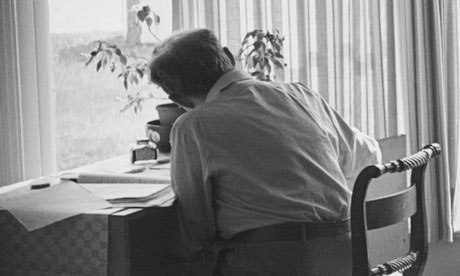Bethan Roberts's dashing third novel pits the stories of romantic rivals against each other. Marion is a grammar-school girl of humble origins whose life is taken over by her adolescent crush on Tom, her friend Sylvie's handsome brother. Patrick Hazlewood is a rich, gay museum curator who has moved to Brighton to get over the death of a previous lover.
Marion and Tom are already courting when Patrick spots Tom in his policeman's uniform and immediately wants him: "I could see it straightaway. He was properly tall, for a start, with shoulders that looked like they could take the weight of the world and yet were exquisitely shaped. Not a hint of bulk. I thought immediately of that wonderful Greek boy in the British museum." What follows is a terrible struggle lasting more than 40 years, inspired by EM Forster's longterm relationship with married policeman Bob Buckingham.
Tom and Marion marry in pouring rain in March 1958, and manage to make love once or twice. Unfortunately for Roberts, their disappointing wedding night in a seaside hotel can't help but evoke Ian McEwan's famous south-coast wedding-night catastrophe in On Chesil Beach, but there is pathos in her description of the new bride reminiscing about her swimming lessons with Tom, because he held her more gently then than he does in bed.
Roberts, whose previous novel The Good Plain Cook was sharply comic, brings her 1950s setting to life with evident pleasure in period props, scents and colours. "We ate in the front room, and Sylvie's mother's budgerigar provided a constant background tweet," Marion recalls. "Sylvie's mother was wearing an orangey shade of lipstick and from where I was sitting I could smell the lavender cleaning fluid on her hands … her bosom was enormous and always propped up on display, like an oversized, well-whipped meringue in a baker's window."
But it is Tom who compels Marion's attention, with his whiff of hair oil mixed with pine-scented talc and, "if you were close enough, the warm, muddy smell of skin beneath". Sadly for her, by the time of their marriage Patrick has captured Tom's erotic attention completely; their halting, gasping, half-ashamed encounters are warmer and sexier than anything Marion will ever experience.
The novel opens in Peacehaven in 1999, where Marion, Tom and Patrick are living together in an unprepossessing bungalow, and Marion is nursing Patrick following a stroke. Her first-person narration, written for her husband, is a confession that will reveal her part in what happened next. That lives have been tragically wasted is clear from the start.
But Roberts wanted to tell Patrick's side of the story too – "my policeman", her title, is his name for Tom – so she intersperses with Marion's memoir large chunks of Patrick's diary describing the affair with Tom, and later his awful experience in prison after being convicted of "acts of gross indecency", or for being what angry, jealous Marion calls a "sexual invert".
While it is interesting to compare Marion's and Patrick's versions of events, and especially their different feelings for Tom, the juxtaposition is a formal oddity, with Patrick's diary entries floating free of the scenario – Marion frantically scribbling her manuscript in the bungalow and storing it in the kitchen drawer – that Roberts has so carefully contrived.
But she writes persuasively about both these characters, who find themselves in conflict not only with the rules governing sexual behaviour but with the desires signalled by their own bodies. Her novel is a humane and evocative portrait of a time when lives were destroyed by intolerance.










